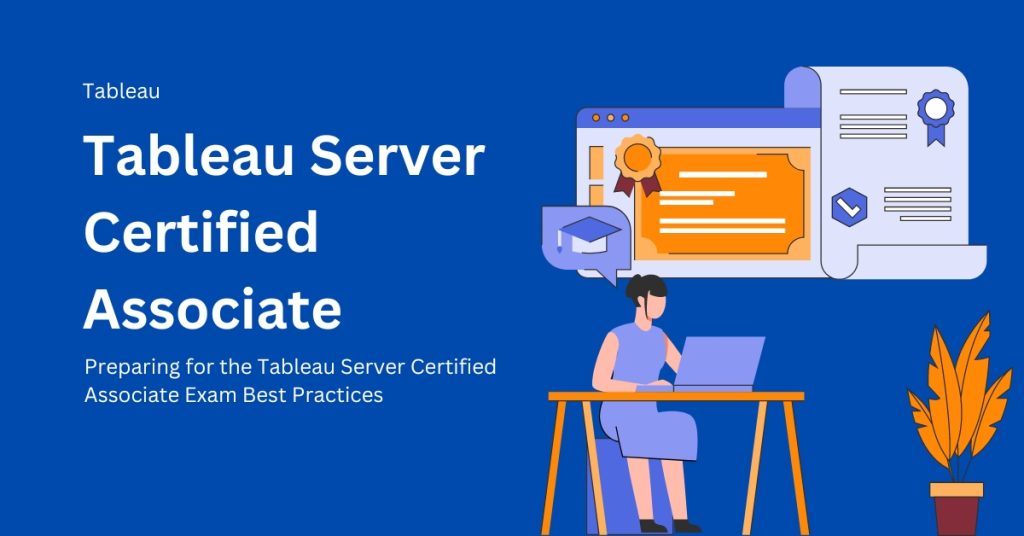
Introduction
In today’s data-driven world, Tableau stands out as a powerful tool for data visualization and business intelligence. For professionals aiming to enhance their expertise and validate their skills, the Tableau Server Certified Associate certification is a significant milestone. This blog will guide you through the best practices for preparing for the Tableau Server Certified Associate Exam, offering insights and strategies to help you succeed.
Understanding the Tableau Server Certified Associate Exam
What is the Tableau Server Certified Associate Exam?
The Tableau Server Certified Associate Exam is designed to test your knowledge and skills in managing Tableau Server. It covers various aspects, including server installation, configuration, and management. This certification is ideal for individuals responsible for maintaining and troubleshooting Tableau Server environments.
Exam Objectives and Content
The exam typically includes the following domains:
- Server Installation and Configuration: Understanding of server architecture, installation, and configuration procedures.
- User and Content Management: Managing users, permissions, and content.
- Server Maintenance: Regular maintenance tasks, troubleshooting, and performance optimization.
- Security and Backup: Implementing security measures and backup strategies.
- Troubleshooting: Diagnosing and resolving common issues.
Best Practices for Preparing for the Exam
1. Understand the Exam Blueprint
Before diving into your studies, familiarize yourself with the exam blueprint. The blueprint outlines the key topics and skills required for the exam. It will help you focus your preparation on the most critical areas.
2. Use Official Study Resources
Leverage official Tableau resources, including the Tableau Server Certified Associate Exam Guide and training materials. Tableau provides a range of resources, including documentation, sample questions, and practice exams.
3. Enroll in a Training Course
Consider enrolling in a Tableau Server training course. Many providers offer courses tailored to the certification exam. These courses often include hands-on labs, interactive sessions, and expert guidance, which can significantly enhance your understanding.
4. Practice with Real-World Scenarios
Practical experience is crucial. Set up a Tableau Server environment and practice various tasks such as installation, configuration, and user management. Real-world scenarios will help reinforce your theoretical knowledge and improve your problem-solving skills.
5. Review Tableau Documentation
Thoroughly review Tableau’s official documentation. This includes the Tableau Server Admin Guide, installation guides, and troubleshooting resources. Understanding these documents will provide you with in-depth knowledge and prepare you for practical questions on the exam.
6. Join Study Groups and Forums
Participate in study groups and online forums. Engaging with others preparing for the same exam can provide valuable insights and tips. Platforms like Tableau Community, LinkedIn groups, and specialized forums offer opportunities to discuss topics, ask questions, and share resources.
7. Take Practice Exams
Practice exams are an essential part of your preparation. They help you familiarize yourself with the exam format, identify weak areas, and build confidence. Review the results of your practice exams to focus on areas where you need improvement.
8. Focus on Key Concepts
Pay special attention to key concepts such as:
- Server Architecture: Understand how Tableau Server components interact and how they are configured.
- User Management: Learn how to manage user roles, permissions, and groups effectively.
- Backup and Recovery: Know the procedures for backing up and restoring Tableau Server data.
- Performance Tuning: Familiarize yourself with techniques for optimizing server performance.
9. Review Case Studies and Use Cases
Study case studies and use cases to understand how Tableau Server is applied in real-world scenarios. This will help you relate theoretical knowledge to practical situations, enhancing your problem-solving skills.
10. Stay Updated with Tableau Releases
Tableau frequently updates its software with new features and improvements. Stay informed about the latest releases and enhancements to ensure that your knowledge is current and relevant.
Exam Day Tips
1. Get a Good Night’s Sleep
Ensure you are well-rested before the exam. A good night’s sleep will help you stay focused and alert during the test.
2. Arrive Early
Plan to arrive at the testing center early to avoid any last-minute stress. Familiarize yourself with the location and the testing process.
3. Read Questions Carefully
Take your time to read each question carefully during the exam. Ensure you understand what is being asked before selecting your answer.
4. Manage Your Time
Keep track of time and manage it effectively during the exam. Allocate time to each section and avoid spending too long on any single question.
5. Review Your Answers
If time permits, review your answers before submitting the exam. Double-check your responses to ensure accuracy.
Conclusion
Preparing for the Tableau Server Certified Associate Exam requires a combination of theoretical knowledge and practical experience. By following these best practices, leveraging official resources, and engaging with the Tableau community, you can enhance your preparation and increase your chances of success. Remember, consistent study and hands-on practice are key to mastering the exam content and achieving your certification goals.
Comments (0)